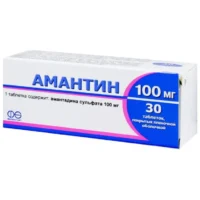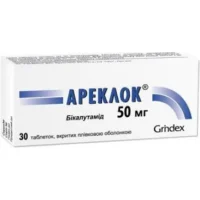Description
Letrozol CRCA Coated Tablets 2.5 mg. №30
Ingredients
Each tablet contains 2.5 mg of Letrozole.
Mechanism of Action
Letrozole, the active ingredient in Letrozol CRCA tablets, is a nonsteroidal aromatase inhibitor. It inhibits the enzyme aromatase, thereby reducing the production of estrogen from androgens. By lowering estrogen levels, Letrozole helps in treating hormone receptor-positive breast cancer.
Pharmacological Properties
Letrozole selectively inhibits aromatase, an enzyme involved in estrogen biosynthesis. It is highly specific and potent, leading to a significant reduction in circulating estrogen levels. This pharmacological action is crucial in the management of hormone receptor-positive breast cancer.
Indications for Use
Letrozol CRCA tablets are indicated for the adjuvant treatment of postmenopausal women with hormone receptor-positive early breast cancer. They are also used for extended adjuvant treatment in postmenopausal women with hormone receptor-positive early breast cancer who have received prior standard adjuvant tamoxifen therapy.
Contraindications
Do not use Letrozol CRCA tablets if you are pregnant, breastfeeding, or allergic to Letrozole. It is contraindicated in premenopausal women, women of childbearing potential, and patients with a known hypersensitivity to Letrozole or any of the tablet’s excipients.
Side Effects
Common side effects of Letrozol CRCA tablets may include hot flashes, fatigue, joint pain, headache, and nausea. Serious side effects such as bone fractures, osteoporosis, and cardiovascular events may occur. Patients should report any adverse reactions to their healthcare provider.
Usage Instructions
The recommended dosage is one 2.5 mg tablet orally once daily, with or without food. Tablets should be swallowed whole with a glass of water at the same time each day. Dosage adjustments may be necessary based on individual patient factors and treatment response.
Benefits Compared to Analogues
Letrozol CRCA tablets offer superior efficacy and safety compared to tamoxifen in the adjuvant treatment of hormone receptor-positive breast cancer. Clinical studies have demonstrated that Letrozole significantly improves disease-free survival rates and reduces the risk of cancer recurrence compared to tamoxifen therapy.
Suitable Patient Groups
Letrozol CRCA tablets are specifically indicated for postmenopausal women with hormone receptor-positive breast cancer. They are not recommended for use in premenopausal women or individuals with known contraindications. Elderly patients may require dose adjustments based on their renal and hepatic function.
Storage and Shelf Life
Store Letrozol CRCA tablets at controlled room temperature away from moisture and heat. Keep the tablets in their original packaging to protect them from light. Check the expiration date on the packaging and do not use expired tablets.
Packaging Description
Letrozol CRCA tablets are supplied in blister packs containing 30 tablets each. The packaging is designed to ensure the stability and integrity of the tablets throughout their shelf life. Each tablet is individually coated to maintain its potency and protect it from external factors.
Clinical Evidence and Proven Effectiveness
Letrozole has been extensively studied in clinical trials for the treatment of hormone receptor-positive breast cancer. Clinical studies have shown that Letrozole as an adjuvant therapy significantly reduces the risk of cancer recurrence and improves overall survival rates in postmenopausal women. The efficacy of Letrozole in hormone receptor-positive breast cancer has been well-established through robust clinical evidence.





